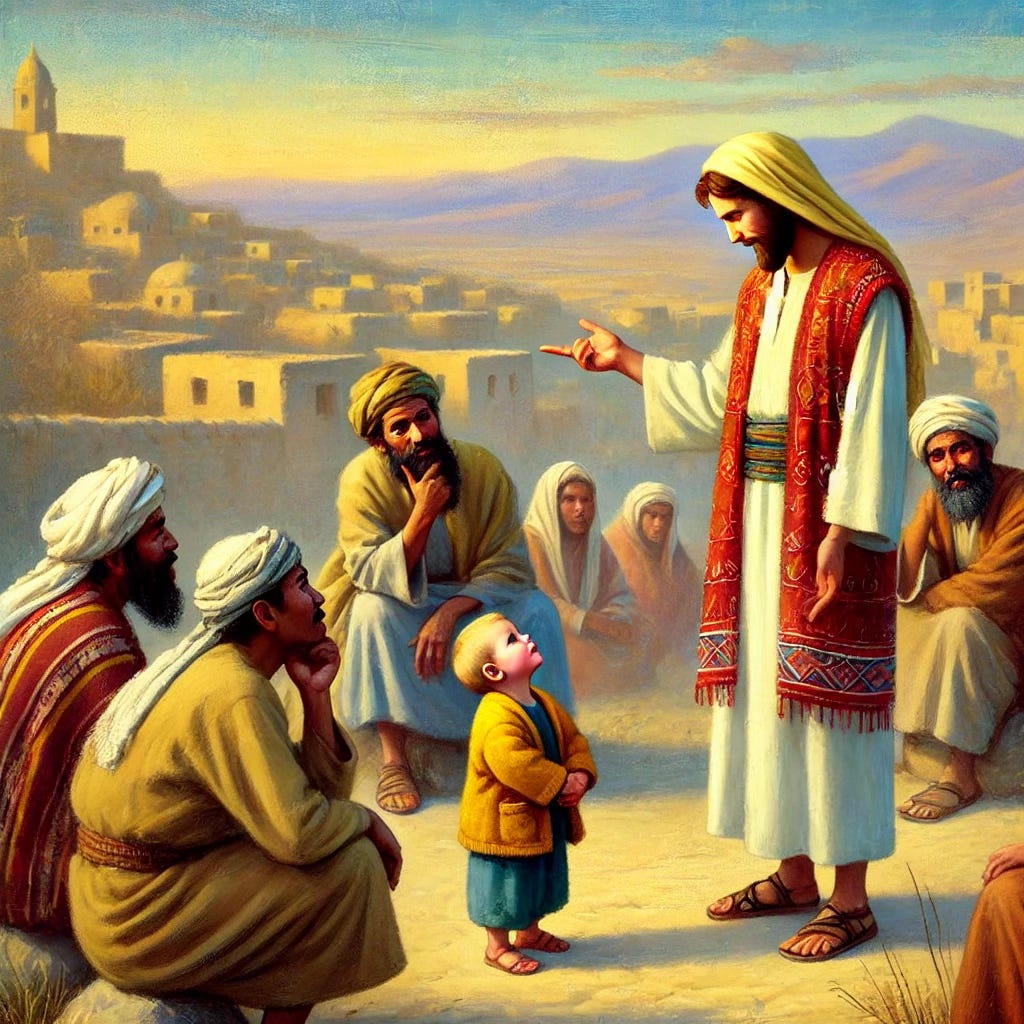The Upside-Down Kingdom: Redefining Greatness
In a world obsessed with status, power, and influence, we often find ourselves chasing after society's definition of greatness. We strive to be the best, to climb the corporate ladder, to gain more followers on social media. But what if true greatness looks entirely different from what we've been led to believe?
The Gospel of Mark offers us a profound glimpse into an alternative view of greatness – one that turns our worldly understanding completely upside down. As Jesus and his disciples journeyed through Galilee (our text picks up at Mark 9:30), a pivotal moment unfolded that would challenge everything they thought they knew about power and position.
Picture the scene: The disciples, likely young men in their teens and early twenties, are arguing among themselves about who is the greatest. It's an insignificant spat reminiscent of children bickering, each wanting to be seen as the best. Yet Jesus, instead of reprimanding them, uses this as a teaching moment.
Sitting down, he gathers them around and says, "If anyone wants to be first, he must be last and servant of all." In that single statement, Jesus flips the script on everything society values. He presents a counter-cultural vision of greatness measured not by how many serve you, but by how many you serve.
To drive his point home even further, Jesus brings a small child into their midst. In first-century culture, children held no status or power. By embracing this child, Jesus demonstrates that true greatness is found in how we treat those society deems least important. He says, "Whoever welcomes one little child such as this in My name, welcomes Me and not just Me but the One who sent Me."
This radical redefinition of greatness cuts to the core of both ancient and modern sensibilities. We live in a "microwave society" where everyone wants instant success, influence, and authority. We celebrate CEOs, influencers, and those who seem to have it all together. But Jesus calls us to a different path – one of humility, service, and putting others first.
Consider the Beatitudes from Matthew's Gospel: "Blessed are the poor in spirit... those who mourn... the meek... those who hunger and thirst for righteousness... the merciful... the pure in heart... the peacemakers... those who are persecuted because of righteousness." These qualities Jesus blesses stand in stark contrast to what the world typically admires.
So how do we embrace this upside-down kingdom mentality? Here are, I think, a few key insights:
1. The Paradox of the Kingdom: In God's economy, the way up is down. The path to true greatness lies through humility and service. This goes against every instinct we have, but it's the heart of Jesus' teaching.
2. Greatness is Defined by Service: Jesus didn't just teach about humility – he embodied it. His entire life, culminating in his sacrificial death on the cross, exemplifies what it means to put others first. We're called to follow his example.
3. True Greatness is Found in Humility: Humility isn't thinking less of yourself; it's thinking of yourself less. It's about lifting others up rather than elevating ourselves.
To illustrate this point, consider an analogy from the world of basketball. While many (almost all honestly) debate whether Michael Jordan, Kobe Bryant, or LeBron James is the greatest of all time, what if we looked at greatness differently? John Stockton, often overlooked in these discussions, actually accounted for more total points (through his own scoring and assists) than Jordan. His greatness was found in elevating his teammates, not just in personal accolades.
This challenges us to reconsider how we measure success and impact.
Are we solely focused on our own achievements, or are we investing in others?
Do we seek the spotlight, or are we content to work behind the scenes, knowing that our service matters to God?
The invitation Jesus extends is clear: step into true greatness by becoming a servant. This doesn't mean thinking less of yourself, but rather thinking of yourself less. It's about reorienting our lives around the needs of others, especially those society often overlooks or marginalizes.
Practically, this might look like:
- Treating children with respect and dignity, recognizing their inherent worth in God's eyes.
- Serving those in our community who are often forgotten or pushed to the margins.
- Using our talents and resources to lift others up rather than simply advancing our own interests and the ever growing accumulation of “stuff”.
- Cultivating, and tirelessly tilling, a heart of humility that seeks to glorify God rather than self.
Living this way isn't easy. It goes against our natural inclinations and the messages bombarding us from culture. But it's the path Jesus walked, and the one he invites us to follow.
As we reflect on these truths, we're challenged to examine our own hearts and motivations.
Are we chasing after worldly definitions of success, or are we embracing the upside-down values of God's kingdom?
Are we striving to be first, or are we willing to be last for the sake of others?
The beauty of this invitation is that it's open to everyone. You don't need special status, influence, or abilities to live this way. All it requires is a willingness to humble ourselves, serve others, and trust that God's definition of greatness is far better than anything the world can offer.
In closing, consider the words of Richard Foster: "Humility... is one of those virtues that is never gained by seeking it. The more we pursue it, the more distant it becomes. To think we have it is sure evidence that we do not." True humility, like true greatness, is found not in how we view ourselves, but in how we treat others – especially the least and the lost.
May we have the courage to embrace this upside-down kingdom, finding our greatest fulfillment not in being served, but in serving others in Jesus' name
!





